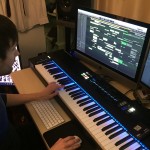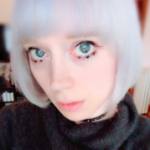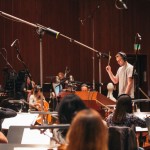Michael A. Levine recently took some time to talk to Original Sound Version about the theme song he composed for Resident Evil Biohazard 7. In the interview he shares details about his musical background, the past projects he’s worked on including one you’ll definitely recognize. He also shares with us some of his favorite covers of his song on Youtube. He even provided us with some more details on the song’s lyrics for those thinking about covering the song in the future, and lets us know what else he’s working on.
Read on for our detailed interview with Michael A. Levine.
Can you tell us a bit about your musical background and training?
I was trained classically as a pianist, then a violinist, but also started writing songs when I was about 10. In fact, I actually made money as a composer before I did as a player – at age 16 a song I wrote was covered on the B side of Canadian pop singer’s single. Seduced by rock n roll, I got an electric violin, a wah-wah pedal, and a delay unit and never looked back! In my 20s I both performed in bands as a violinist and did studio session work, mostly as a keyboard player.
According to the Video Game Music Database you were born in Tokyo, Japan, do you still reside there, and growing up what were your main musical influences?
My father was a University professor who specialized in Japanese labor relations. I am an “Edokko” which means “born in Edo” the old name for Tokyo, having been born there while he was doing research for a book he was writing. However, we left when I was an infant and though we returned several times it was never for more than 6 months at a time. I learned more about Japanese culture from parents, who met during WWII in Naval intelligence, both learning Japanese.
My main musical influences were the records my mom played which, in retrospect, were remarkably eclectic, ruining my ability to do just one thing for life. Standouts included Miles Davis, Tom Lehrer, Pete Seeger, John Coltrane, Stravinsky, Harry Partch, music from Bali, Field hollers and blues, the Clancy Brothers, The Smothers Brothers, Menotti, and a whole slew of broadway shows: Gigi, Camelot, South Pacific, Oklahoma, Lil Abner, Fiorello, My Fair Lady. And a LOT more.
Have you worked on the audio for other video games in the past? What can you tell us about that?
This is my introduction to gaming. I’ve worked on television shows (Cold Case, Star Wars Detours); films (Landfill Harmonic; working for Hans Zimmer: The Simpsons Movie, The Dark Knight); produced records (The Naked Bros., Lorde’s cover of Everybody Wants to Rule the World); and written concert music and musical theater. But the one thing everybody in the U.S. remembers is the Kit Kat “Gimme A Break” jingle.
Do you have any personal history with the Resident Evil franchise (Play the games/Films) or was Resident Evil 7, your first experience?
I am a newbie!
Can you tell us how you became involved in the project?
I am fortunate that one of my agents, Koyo Sonae, is Japanese by birth and made the connection. The clients really liked the version of “Everybody Wants to Rule the World” sung by Lorde that I produced with Lucas Cantor.
The theme song, “Go Tell Aunt Rhody” is originally an American traditional song originated as a gavotte composed by Jean-Jacques Rousseau for his opera Le devin du village (1752). What can you tell me about your relationship with this traditional song?
When Capcom approached me they asked if there was a traditional song that might work for the game. I remembered Rhody, which I had learned as a kid in school. I also knew that Japan has a song called Musunde that has the same melody, also a children’s song. This is because American teachers helped establish the Japanese public school system in the 1870s and brought the song with them. Most Japanese believe the song originated in Japan.
I added the verse, which relates to the game, and changed the lyrics on the chorus from “the old grey goose is dead” to “everybody’s dead”.
BTW, although Rousseau used the melody in his opera, it was a very common practice then to borrow traditional songs and reset them. Beethoven did this in his 9th symphony – the Ode to Joy was a well-established hymn. Not sure that Rhody didn’t pre-date Rousseau.
The vocal work on the song is wonderful, and I noticed that there’s both an English version performed by Jordan Reyne, and Japanese version of the song performed by Yuki Hayashi. I also noted that background vocals feature with more intensity later in the song. Were both versions recorded together and who performed the background vocals?
Jordan has an exceptionally compelling quality to her voice that makes you want to hear “what’s next”? The background voices were sung by Mariana Barreto, who also sang all the backgrounds on Lorde’s “Everybody Wants to Rule the World”. She and I recently did an EP together under the band name Samira & The Wind. Fun fact: she is my daughter.
Thanks for asking about Yuki’s version. I didn’t know it existed until you asked about it! Yuki was one of the score composers on the game – I want to hear it!
I love that there have been a many cover versions. Some of these videos have pretty impressive production quality:
Here’s an “Epic Metal” version:
And a (mostly) solo piano version:
And a Metal version with a basso profundo lead singer:
If you’re reading this interview and are planning to do a cover, or know someone who is you might be interested to know that there are more lyrics which never made the release version. I originally wrote two verses, but it ran too long. The release version is the first half of verse 1 combined with the second half of verse 2.
Here are the original lyrics:
Go tell Aunt Rhody x3
that everybody’s deadI was raised in a deep, dark hole
a prisoner with no parole
they locked me up and took my soul
ashamed of what they’d madeRaised apart and so alone
I dreamt of family of my own
I escaped and now they know
that they should be afraidGo tell Aunt Rhody x3
that everybody’s deadOnly she believed in me
she saw a strange humanity
But she will never set me free
while he is in her heartI called to him and he will come
she’ll run to him like he’s the one
his arms outstretched, but when she’s done
He’ll be torn apartGo tell Aunt Rhody x6
that everybody’s dead
Is there anything else you would like to tell us about your work on this song?
One of the things I loved about the process was that Capcom kept pushing me to make it more extreme and inventive. Usually, clients are begging me to be more “normal”. In this case I was like, “You want weird? I’ll show you weird!” And they’d come back with, “Could you go a little further, please?” Composer heaven.
Do you have any future projects that you’re working on that you can tell us about?
I already mentioned Samira & The Wind, who you can also check out on Spotify.
I also scored five films that are in various stages of completion which are City 40 – on Netflix, Landfill Harmonic – on HBO, Served Like A Girl – which just premiered at SXSW, and both The Summerland Project and Love Meets Hope whose release dates haven’t been set yet.
OSV would like to thank Michael A. Levine for taking the time to talk about his music with us. For updates on his latest efforts you can visit his website or check out his artist Facebook page. You can purchase a copy of the theme song or full soundtrack digitally at Amazon, or Sumthing Else.
Have you played Resident Evil Biohazard 7? What did you think of the theme song?
Tags: Capcom, Composers, Features, Interviews, Jordan Reyne, Mariana Barreto, Michael A. Levine, Resident Evil 7, Yuki Hayashi









































Hi there,
Guest Posts are one of the most powerful backlinks you can get for sample-url.com.
Our list contains over 6,500 handpicked websites that accept guest posts, with each site’s SEO metrics and contact details, allowing you to contact them all directly and save thousands on paying overpriced agency fees. You can also sell the list on for a profit!
If you’d like more information, you can reply to this email or visit: https://guestpostdownload.com
Kind Regards,
Felicity